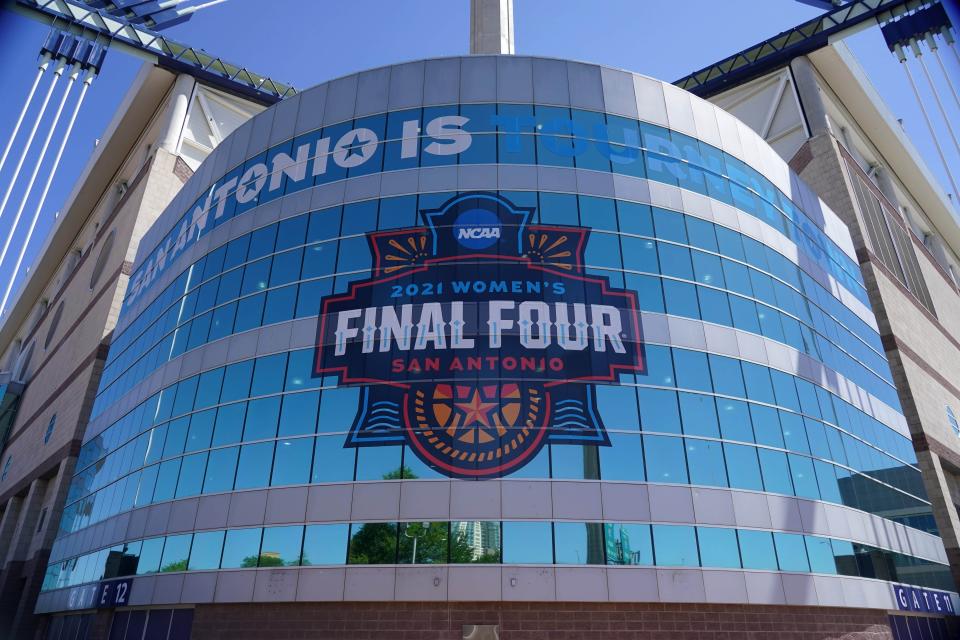Opinion: NCAA and leagues shouldn't play big games in Texas as long as Texas plays games with women's lives
Instead of pink jerseys, ladies nights and other performative gestures, there’s a really simple way for sports leagues and organizations to prove they actually do care about women.
Boycott Texas.
No NCAA Final Fours in Houston or Dallas in 2023, or San Antonio in 2025. No All-Star Games or Super Bowl. No NFL Combine that Dallas Cowboys owner Jerry Jones covets.
So long as Texas is determined to strip women of their rights, refusing to allow them control of their own bodies, then organizations such as the NCAA, NFL, Major League Baseball and others should strip Texas of the privilege of hosting big-ticket sporting events. The opinions of most people in Texas, let alone the rest of the country, haven’t been enough to sway Gov. Greg Abbott and his ilk, but maybe watching other states hold the games and tournaments that would have brought millions in revenue to Texas will.
For the NCAA, this shouldn’t even be a matter of debate.
About half of collegiate athletes are women, and some are among the 500 current and former athletes who filed an amicus brief with the Supreme Court on Monday over the Mississippi law that bans most abortions after 15 weeks, well before viability. The amicus brief argues that women wouldn’t be able to take advantage of the opportunities that sports affords – athletic scholarships, professional careers, commercial opportunities – without also having access to abortion.

The Texas law is even more draconian than Mississippi’s, banning abortions after six weeks and putting $10,000 bounties on anyone who assists a woman having the procedure after that. That would include doctors, nurses, family members, even Uber drivers.
One might imagine it could also include a teammate of an NCAA athlete.
“We do not have athletic choices, or work choices, if we do not have reproductive choices,” Noreen Farrell, executive director of Equal Rights Advocates, an organization dedicated to protecting economic and educational access for women and girls, said in an email.
The NCAA was founded, in part, to “keep college athletes safe,” and no one with common sense can argue that the new Texas law does that.
SAFETY SCHOOL: North Carolina girl goes viral after starting at safety for varsity HS football team
'IT"S JUST NOT RIGHT:' Advocacy group says Phillies minor leaguers reprimanded for speaking out
If standing up for its women athletes isn’t enough for the NCAA, how about its member institutions? Colleges and universities are supposed to be champions of science, history and critical thinking. If Texas is going to show such blatant disregard for those ideals, the NCAA cannot allow it to benefit from its championship events.
It’s not as if this kind of protest would be a bold step for the NCAA, by the way. The organization has, rightly, refused to allow its championship events in states that promoted or tolerated discrimination, be it against Black Americans or the LGBTQ+ community, and those bans have proven to be quite effective.
North Carolina scrapped its “bathroom bill” that targeted transgender people. Mississippi removed the Confederate banner from its state flag.
The NCAA also would be following the lead of several companies that have already expressed opposition to the Texas law. Uber and Lyft have offered to pay legal fees for any drivers that are sued. Salesforce said it would pay relocation costs for employees who want to leave Texas. “The Wire” creator David Simon said Tuesday night he will find a new shooting location for his upcoming HBO miniseries.
“If an employer, this is beyond politics,” Simon wrote on Twitter. “I can’t and won’t ask female cast/crew to forgo civil liberties to film there.”
If an employer, this is beyond politics. I’m turning in scripts next month on an HBO non-fiction miniseries based on events in Texas, but I can’t and won’t ask female cast/crew to forgo civil liberties to film there. What else looks like Dallas/Ft. Worth? https://t.co/q6Py6XikYh
— David Simon (@AoDespair) September 20, 2021
None of the professional leagues have a signature event scheduled for Texas in the near future – though the Texas Rangers have a new stadium and MLB hasn’t selected a host yet for the All-Star Games in 2024 and 2025. But there is still power in the leagues letting Texas officials know the state will hold as much appeal as a Superfund site so long as they continue their ghoulish obsession with policing women’s bodies.
After all, women make up an increasing percentage of the leagues’ fan bases. And studies have shown that women drive 70 percent to 80 percent of purchasing decisions. Imagine the impact alienating them could have on, say, Roger Goodell's goal of the NFL reaching $25 billion in revenue by 2027.
Texas lawmakers are playing dangerous games with women's lives. The NCAA and professional leagues can show their disapproval by playing their games elsewhere.
Follow USA TODAY Sports columnist Nancy Armour on Twitter @nrarmour.
This article originally appeared on USA TODAY: Texas abortion law: NCAA, leagues must take stand to protect women

